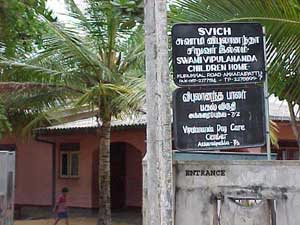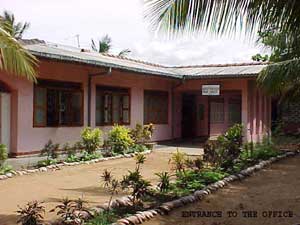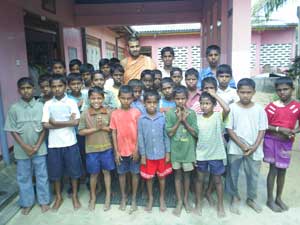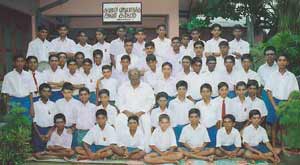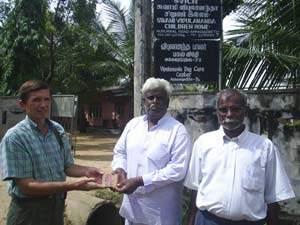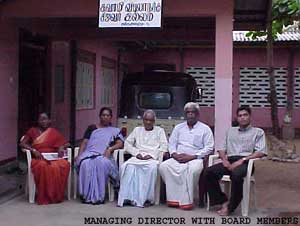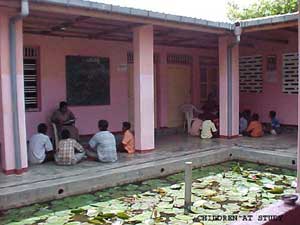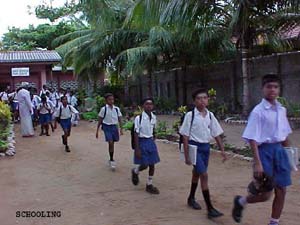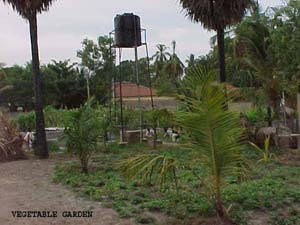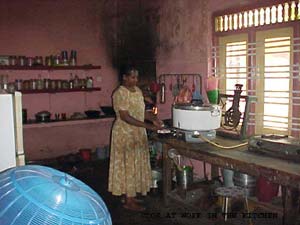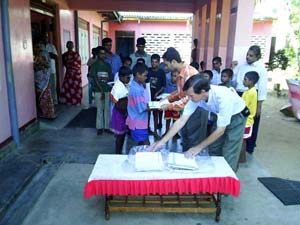
|
|||||||||||||||||||||
|
| |||||||||||||||||||||
Swami Vipulananda Children's HomeKurukula Road, Alayadivembu Division, AkkaraipattuHistory of Swami Vipulananda Children Home
BackgroundThe country underwent a civil war like situation based on the ethnic issue since the year 1983 in the North East regions until May 2009. The arms struggle reached its peak in 1990 in these areas and almost the entire village people fled to the jungles and forests to safe guard their lives as the war situation started its ferocity resulting in loss of lives, wounds extensively making people handicapped, looting of belongings, indiscriminate arrests and harassments by armed forces. Only a handful of persons who were chieftains of the area were able to stay in the area, although they had to face many difficulties. They made representations to the government and tried their best to bring the situation under control and the people startled returning to their village. But the situation was tense and the people were helpless. Most of the families had lost either their bread-winner or one or more members of the family. The main problem faced was the future of the children who had lost their parents, both or one of them. It is evident to all that when a war situation is experienced mainly the needy people suffer a lot as they earn only for their bread on a day to day basis. The people of the area are also of the same kind and most of them are ‘coolie' workers for farming, fishing or other odd jobs. Considering the grave situation some of the village gentlemen met and discussed plans to do something for the people and the village. Mr. T. Kailayapillai, a kind hearted man proposed to establish an orphanage to take care of the orphaned and destitute children. Mr. N. Manivasagan, Justice of the Peace extended his full support to Mr. Kailayapillai and a committee was formed with the inclusion of some other noble people. The task of implementing the programme was given to the Young Men's Hindu Association (YMHA) to which Mr. T. Kailayapillai was the President. It is a heart breaking decision that Mr. Kailayapillai had relinquished his job in the State sector to make fruitful of the decision. The Orphanage was started on 29.04.1992 in a small building owned by the Rural Development Society with the view of running it until a permanent place is found as the situation compelled it. The name of the Orphanage was unanimously accepted as "Vipulananda Students' Orphanage" as an honour to Swami Vipulananda. It is also appropriate to say that a co-institution was established, namely ‘Mahashakthi Foundation' simultaneously by Mr. Manivasagan, Justice of the Peace to act in conformity with the Orphanage to help people in other fields. The Founder Members Mr. T. Kailayapillai and Mr. N. Manivasagan still work for the growth and betterment of the Orphanage. Most of the Pioneer Members are also in the field of activities and extend their heartfelt assistance as and when require, actively. The objective at the time was to protect the younger generation from being mislead and become a headache to the community and the country. But the proceeds from the war torn area were a lot of children who dropped schooling and wandered in the streets and lanes like as nobody was there to care for them. The area, prior to the war situation was calm and people were leading a life of their religious accord. The well to do and educated people were helping the poor and feeble with nobility to make the area like a heaven. So, the above nobles of the village decided to form such an establishment to bring back the heaven land and to make the people to live in calm and harmony. Objectives (Missions)The prime objective was to bring up the helpless children who were orphaned, abandoned or destitute in all aspects, namely mentally and physically as the war situation caused serious effects on the sector of population. Almost every child has its own problem such as loss of self-confidence and became with retarded minds. Therefore it is not only a matter of bread and butter but also include many other human needs are to be taken in to consideration as these children are to form the society in the future.
InfrastructureThe Orphanage was established in 1992 using a small building owned by the Rural Development Society of the village. Initially five children were admitted to the orphanage but the activities made for a rapid increase in the number of inmates and the administration suffocated for the congestion. Though a number of generous people help the orphanage in various ways a land was to be acquired for the erection of a building to facilitate the present and future accommodation of children. Dr. M. Thevarajan, who helps and supports the Orphanage at various times, discussed the matter with the authorities of Siddhi Vinayagar Temple, a Hindu Temple situated in the village owning lands and obtained a portion of land to lay the infrastructure according to the plan drawn by Mr. Velu Sanmuganathan, Civil Engineer. When the administration decided to commence the work, Mr. Samiththamby, a retired teacher and Scholar in Hinduism came forward to finance the construction a well for drinking water but the size serves a lot and commenced the activities in the new land. The work was commenced with the money collected from the donors and well wishers. In 1993 a hall was completed and it was then named as Prayer Hall. To complete this building Mr. J. Thiviyanathan, Member of Parliament at that time allocated a sum from the decentralized budget of the Government. Dr. M. Devarajan and his wife who is also a Medical Officer helped to construct a kitchen at the cost of Rs.40,000/- . A column of toilets was built with the aid from the NORAD. However the number of inmates was in the increase and the administration approached the Ministry of Rehabilitation and the then Hon. Minister M.H.M. Ashraff took measures to allocate Rs.1.5million to construct buildings to suit the needs of the Orphanage. The Ramakrishna Mission came to the rescue with a sum of Rs.40,000/- when the money was inadequate to finish the building. Funds of the Orphanage and its effectsThe Orphanage was started on the idea arose from mercy of some village nobles and at that dismal situation; no consideration was given to establish a regular fund system. All activities depended on some generous donors of the area who are at a well to do position. But the Orphanage got a permanent structure of the area and procured a place of residence and the matters were regularized. Mr. Kailayapillai was appointed as the Head of the Orphanage and plans were drawn to form an administrative body namely a Board of Directors and an Administrative Body. Steps were taken to register the Orphanage with the Department of Social Service at State level and with the Probation Department for Child Care at the Provincial level to get the financial allocation from their Budgets. At the beginning the Government provided some funds to erect a section of the building but after that there was a decline because of the continuity of war situation. The PCC gives assistance for fundamental needs which at present meets only ten percent (10%) of the total expenditure. The Orphanage depends heavily on the public and donor agencies, local and foreign for its funds. The people of the area helps in numerous ways but less financially as majority of them live under poverty line and economically affected due to war situation. Only a handful of individual donors are available and it is also in the form of paddy as they do farming. The administration works for the whole time to fill the bins as the matter is a matter between life and death. Some foreign donor agencies helped some construction work of sections of buildings, toilets, water supply system etc. Although there was a good collection of assistance in the past the Orphanage at present suffers a lot economically as most of the donor agencies stopped or reduced their assistance after the commencement of peace process in this country for the last two years or so. This is a situation just the opposite of what the Orphanage expected. It is aware to all that this is a matter of mind and body of children and they are on the growing and after certain age they have to leave the Orphanage and lead their life in their own. But for the benefit of the children, to get trained, schemes to lay some vocational training have been planned and with the formation of peace situation the children who finish their training can go out to live in their own. Now the Orphanage finds it very difficult even to feed the children to the optimum level as only 40% of the total expenditure is able to meet from the assistance received. Little by little loans and debts are piling up and the Orphanage has to sell some of its cattle which are sources of income derived, to meet the expenses of food. The needed funds are collected under severe difficulty as the people not only live under the level of standard but formation of several other refugees' camps and orphanages in the region. As the area is an agricultural one the magnanimity of a little number of farmers help to feed the children to the minimum. If the situation persists the Home has to think of some sharp measures which would result some children to leave the Home. Staff of the Orphanage as VolunteersIt may be surprising that all the staff members are volunteers. Even the Head of the Orphanage who relinquished his employment to make use of his talents to upgrade the standards of the Orphanage work without any remuneration. There are clerks, teachers and laborers all of whom work on a goodwill nature as this is an orphanage depends on grants and donations which are already insufficient even to feed the inmates. Though they work on voluntary basis they do not neglect but to be perfect. This is a great relief to the Orphanage in the financial side but the administration feels guilty to make use of genuine workers on ‘serve for nothing' basis. Therefore the administration tries hard to get a stable income at least to pay a small salary to these employees. The inmates of the Orphanage also work as to the situation and ability. It is convincible that in the long run this would fail and reasonable payment should be made to employees as the economic situation of the people goes downwards. The administration includes this factor also when drawing any programme for the future. Future PlansThis Orphanage is run for more than ten years and time to time the activities are reviewed and necessary programmes are drawn for the benefit of the inmates who are on the increase in number. And the grants and donations are decreasing causing an unbalanced situation between the income and expenditure. Therefore to overcome this, the administration plans to start new projects which would help the Orphanage to stand on its own legs. When these schemes are implemented it will earn the required fund to the Orphanage on one hand and give employment opportunities to the inmates on the other. The society will also be benefited when they have such facilities around their area and the cost would be lower. The main areas to be covered are as follows:
Activities of the Orphanage: Past to PresentAt the inception of the Orphanage only five children were admitted and five Foster Parents were also selected to look after each child's needs. Only a limited amount of fund was found through collection from the village residents. The administration was very efficient and more and more children joined the Orphanage. The children were provided with the basic needs and arrangements were made to send the children to schools to get at least their basic education. The basic objective to provide the children all the needful things to prepare them as decent citizens was stictly followed. When the Orphanage was shifted to its present permanent site it consisted 30 children all of them were looked after as if they were in a well to do family. From time to time assistances were received locally and internationally. The people who went abroad from this village never failed to help this Orphanage. The administration tried its best to make known of this Orphanage both to admit needy children as well as to get needful assistance. The number of children who sought refuge in the Orphanage had a steady increase and at present 80 children are living here and the Home is responsible for their well-being. It is evident that when the number of inmates increases additional buildings are also need to accommodate them. Some buildings were constructed but it is noted that the increases are not in proportion. It should be taken into account this is a matter dealing with human where it is children and they are growing not only physically but also mentally and emotionally. The administration is well aware of the facts and draws the plans accordingly. Most of the children do not have their own residence to go back and they have to be made up to lead their life in future themselves. Therefore the plans are now drawn beyond the mere provision of basic needs and education with the implementation of several other formal activities. As all the children are not capable of continuing their studies up to the University level or other Professional studies, such children are identified and are given vocational training according to their ability and knowledge. For this the Home started initially a Centre for Carpentry Training and a Dairy Farm. The area is an agricultural one and these children can be engaged in Farming in future and therefore training on agricultural methods and handling of modern equipments would be helpful. A small piece of land is allocated for the purpose. They are given training in driving of different vehicles including Tractors which would help them in the agriculture field. The assistance given by the donors helped the Orphanage to purchase a Three-wheeler which is not only serve the Orphanage to earn a fraction of income but also used to train the children who are willing for driving vehicles. On the Educational side Private Tuition classes are arranged in addition to the school education to the children to make a thorough study of their subjects. For this teachers are arranged. The educational stationery is given by the administration without any restrictions. Students proved this sector as a successful one by entering universities. The Orphanage runs a Nursery School which has a capacity of 100 children and this was an idea of improving the standards of the small children with parents but under poverty. The children are provided with all stationery and things for fun and play. A scheme to provide balanced nutritional food is also underway but shortage of fund restricts regularity. The administration now thinks of creating income deriving schemes as the donations and assistance receiving is in the diminishing return pattern and also fall of country's economy cause for high cost of living.
Present Needs of the HomeAt present the Home is experiencing an acute shortage of funds to implement its programmes. Earlier there were only a small number of such establishments but due the war situation the number of refugees increases day by day and the people who are compelled to reduce their contributions as they are also under financial difficulties. Further the Government has plans to rehabilitate the war-affected people but it is also in a slow movement for lack of funds. The children who go to school find it difficult to do their studies in the Home as study halls are not available. Even the Home has arranges some volunteer teachers to help the children in their school lessons non-availability of halls hinders it. It should also be taken in to account that the children are reading in different standards and it is not possible to let all the children in the same hall to study. Although several teachers willing to assist the children lack of transport facilities in the late evenings makes them to think otherwise for their return home after the classes end. Some teachers are ready to serve if they are given temporary accommodation to stay for the night. Considering the above facts the Home planned a two-storey building with study-halls and rooms for the teachers as well as other volunteers of the Home. The scheme was placed to the USAID for aid but it is still pending. The Home looks for aid to erect such building with assistance from those who could do. There are a number of vocational training programmes started by the Home but availability of equipments and other instrumental needs are less and the Home is in a difficult position to find a solution. The children are growing and most of them reached their age for deciding their future life but they are at bay without an occupation.
As the Home has grown to a considerable size it thinks to lay plans for a regular income to the Home for its self-reliance as the contributions and donations are declining year by year in contrast to the increase in number of the inmates. Therefore we expect contributions and donations, even small it would be, to make a resource for the Home's need at least to provide them, present and would be future, to build a Contact informationMr. T. Kailayapillai, Managing Director Compiled by S. Sathananthan
|
